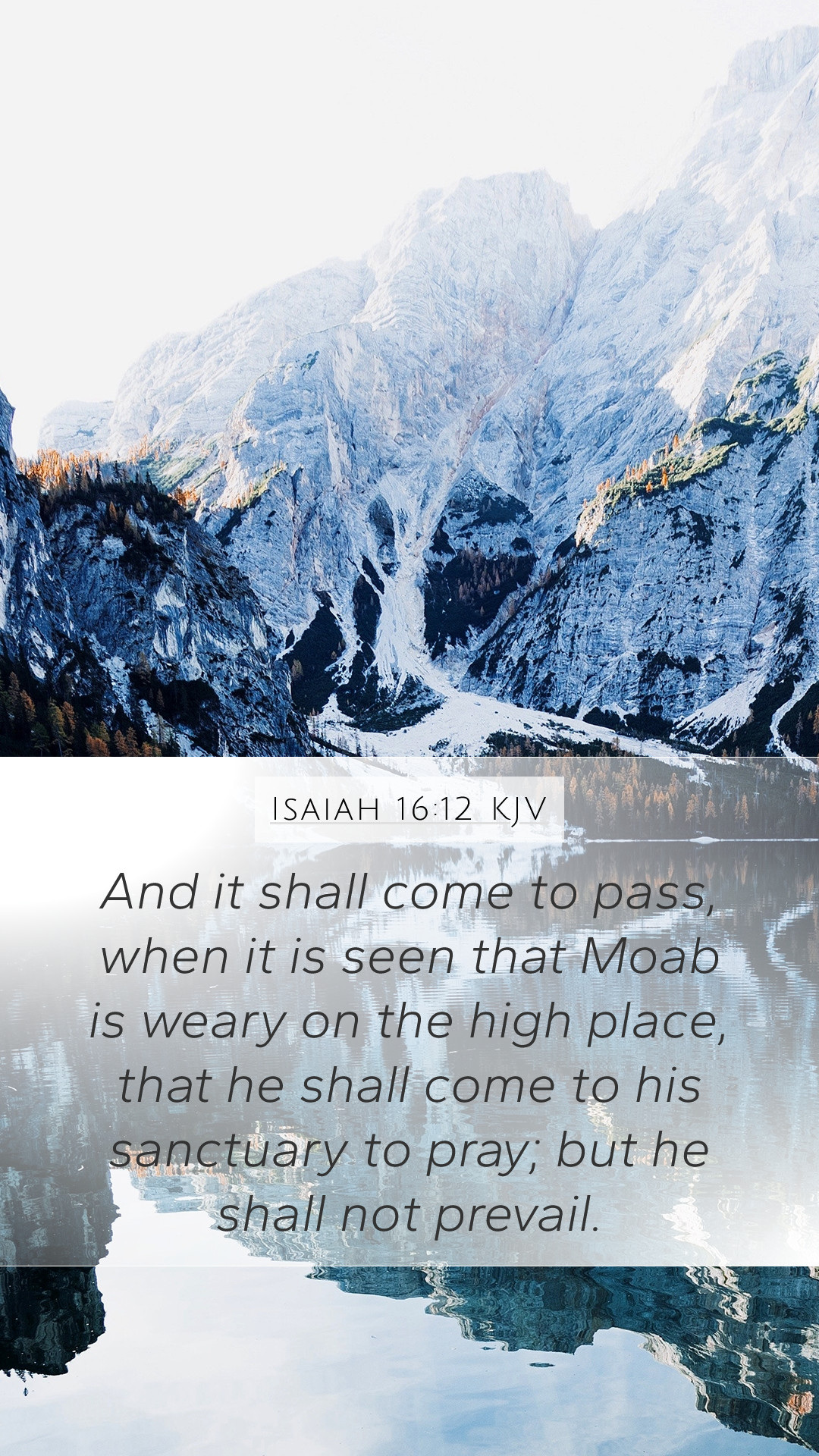Understanding Isaiah 16:12
Isaiah 16:12 provides insights into the context and significance surrounding Moab's cry for help and its misguided reliance on foreign alliances. This verse highlights the futility of seeking assistance from human powers rather than turning to God for deliverance. Below is a detailed analysis of the verse, combining insights from various public domain commentaries such as those by Matthew Henry, Albert Barnes, and Adam Clarke.
Bible Verse Meaning
In Isaiah 16:12, the prophet Isaiah depicts Moab turning towards its gods in a moment of desperation. The content of this verse reveals an underlying theme of reliance on idols—representing humans’ tendency to seek comfort in false assurances rather than seeking trust in the true God. The verse reads:
“And it shall come to pass, when it is seen that Moab is weary on the high places, that he shall come to his sanctuary to pray; but he shall not prevail.”
Scripture Analysis and Commentary
Contextual Background
Moab, historically a neighbor of Israel, often engaged in conflicts and alliances that led to its eventual downfall. The spiritual condition of Moab during this period was marked by idolatry and an inability to recognize their dependence on God.
Matthew Henry's Commentary Insights
According to Matthew Henry, this verse serves as a warning about the lack of efficacy in the prayers of Moab, emphasizing that even as they search for their sanctuary, God will not hear them because their hearts are far from Him.
Albert Barnes' Commentary Insights
Albert Barnes notes that the mention of "weary on the high places" symbolizes Moab’s attempts at worshipping their idols, which ultimately lead to despair. Their efforts are rendered useless when they come seeking support, as their requests will not reach the true power needed for salvation.
Adam Clarke's Commentary Insights
Adam Clarke highlights that the "sanctuary" represents not just a physical space but a state of spiritual engagement. Moab's interaction shows a misunderstanding of true worship and reflects a wider theme of misdirected devotion that plagued many nations of that time.
Thematic Concepts
- Idolatry and its Consequences: The verse serves as a reminder of how reliance on false gods leads to spiritual desolation.
- Divine Absence: A central theme is God’s absence in the prayers of those who do not seek Him earnestly.
- Human Efforts vs. Divine Power: The contrast between human actions and the necessity of divine intervention is vivid in this narrative.
Application of the Verse
This verse invites a reflection on our own spiritual lives—encouraging believers to evaluate where they place their trust in times of trouble. Just as Moab sought help from their idols, many people today may turn to temporary solutions for their woes rather than relying on faith in God.
Connecting to Broader Biblical Themes
The teachings of Isaiah 16:12 can be linked to several broader biblical principles, including:
- Trust in God: Psalm 37:5 highlights the importance of committing one’s way to the Lord.
- The futility of idol worship: Isaiah 44:9-20 provides a commentary on the deception of idols.
- The need for genuine repentance: Jeremiah 29:13 emphasizes seeking God with a whole heart.
Historical Context of the Verse
Understanding the historical context of Isaiah 16:12 deepens our appreciation of its message. It was a time of political upheaval and instability for Moab, as they faced military threats from surrounding nations. The reliance on foreign powers and false deities reflects the nation's spiritual decline and lack of true faith.
Final Thoughts
Isaiah 16:12 challenges readers to seek a deeper understanding of their faith and reliance on God. It serves as a poignant reminder to turn away from the allure of worldly solutions and toward the unwavering support that comes from genuine faith in the Almighty.
Related Cross References
- Isaiah 2:8 - Discusses idolatry and its pervasiveness among the people.
- Isaiah 30:1-3 - Explores the consequences of seeking help from Egypt, symbolizing worldly powers.
- Jeremiah 10:14 - Describes the foolishness of idolatry and the reality of human ignorance.


